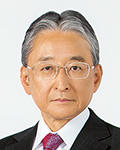Messages from Keidanren Executives and Contributed articles to Keidanren Journals
April, 2019
In Support of the Integration of Arts and Science
(Liberal Arts and Innovation)

It has long been said that Japan's ability to produce innovation has become stagnant. Indeed, the White Paper on Science and Technology 2018 points out that Japan's fundamental ability to produce innovation is declining rapidly. Recent international affairs have also seen the development of more diverse and complex issues, making it clear that the obstacles facing innovation are now tougher to overcome than ever.
Though innovation has been defined in a variety of ways since Schumpeter's theory of innovation, I personally define it as "the act of combining multiple aspects of existing knowledge to produce new social and economic value." In modern society, however, with its varied and complex issues, it is difficult for companies to create innovation solely through the combination of specialized skills and knowledge. Innovation in modern society requires integration with skills, ideas, and existing knowledge from different fields, as well as a leadership backed by broad-based emotional intelligence and the skill to apply what has been learned. It is important, in other words, to study liberal arts, since it allows for the kind of multi-faceted perspective necessary for this kind of critical thinking.
In Western countries, liberal arts as a general educational concept has been passed down uninterrupted through the generations. In Japan, the incorporation of liberal arts in education has been recent, with more universities adopting educational ideals that look towards the integration of arts and science, and learning that focuses on multi-faceted knowledge and ideas that transcend existing academic boundaries. Japanese industry, government, and academia should work together towards the development of liberal arts personnel. Encouraging the study of liberal arts, adhering to the genba, genbutsu, genjitsu principle (principle that emphasizes the importance of learning the facts at the ground level), and thus helping improve critical thinking skills will make for the development of personnel who can approach social issues with much broader perspectives.
The development of such personnel will help lead to solutions for complex social issues—worldwide environmental issues like global warming and the increasing frequency of disasters in certain areas—that cannot be solved through the lens of just one particular field or specialty.
The integration of arts and science should be encouraged to produce innovation, thereby ridding Japan of its sense of stagnation, and to allow Japan to reestablish its position in the global economy.

